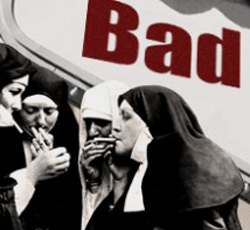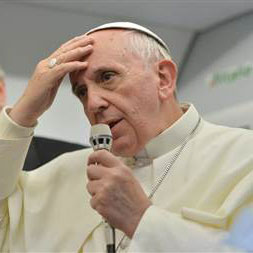I watched The Nativity Story last night. It’s very good. Excellent, even.
I didn’t notice, but someone else watching remarked on how well the film depicted our Lady’s development, from a simple 14-year-old peasant girl, to someone much stronger, maternal and even regal. If that sounds too over the top and non-historical, rest assured that it was subtle enough for me to miss, but real enough for me to recognise after it was pointed out.
I was more focused on the depiction of St Joseph, and his reaction to Mary’s pregnancy. St Matthew describes it thus:
Her husband Joseph, being a righteous man [or “a just man”, or “a man faithful to the law”] and unwilling to expose her to public disgrace, planned to dismiss her quietly. (Mt 1:19)
It would be easy to portray Joseph as someone scandalised by our Lady’s pregnancy, and sceptical of her claims of a virgin conception. I think that’s the popular interpretation, and no wonder. How many of us would take seriously a girl who is pregnant, but insists she’s still a virgin? I wouldn’t. So according to this theory, Joseph didn’t believe Mary, but his virtue was demonstrated by his mercy — mercy being more righteous than obedience to the law. Alternatively, it could be argued that St Joseph was so in love with our Lady, and so familiar with her own uncommon virtue, that he believed her story of a virgin conception, and planned to dismiss her quietly only because his humility compelled him to withdraw from this miraculous mystery.
The Nativity Story treats this controversy very well. St Joseph’s immediate reaction is one of shock and anger; upon laying eyes on the obviously-pregnant Mary after a six-month absence, he walks away in silence. Later, as Mary struggles to convince her parents of the circumstances of her pregnancy, Joseph shows greater compassion than they do, and seems torn between pious credulity and sensible scepticism. By the time the angel appears to him in a dream, the viewer is left wondering if he doesn’t already believe Mary on the basis of her own testimony.
The film depicts Mary in labour pains, and our Lord’s birth as entirely natural. This is controversial too. Some argue that since our Lady is the Immaculate Conception, she enjoyed the same privileges Eve received back in the good old days of Original Grace. That means that she would not have been afflicted with difficulty in childbirth, and that she would not have died. Others counter that these privileges do not necessarily follow from the Immaculate Conception, and since our Lord himself endured suffering and death, it seems unlikely that God would exempt Mary from “the human condition.”
I tend to the latter view myself, but then, I’m a child of my age, with a devotion to our Lord’s sacred humanity, and by implication, our Lady’s “ordinariness” also. My late grandfather belonged to a different age (obviously), and his faith and piety — much greater than my own — attached more importance to our Lord’s divinity, and our Lady’s privileged status. Granddad and I debated this point once or twice. (He was a great theological sparring partner, long before I contemplated seminary studies!) To help his case, he had the private revelations of Blessed Anne Catherine Emmerich to back him up. And to help my case, I’ve got … umm … common sense? But common sense wouldn’t have served St Joseph very well, would it?
I’m interested to know what readers think. Cast your mind back to the stable in Bethlehem. Was it a natural childbirth, or something miraculous?






The Nativity Story film fails miserably in two aspects. The lighting levels and the sound levels. Yes, I know all about accuracy of context, but really, St Francis of Assisi when he introduced crib scenes, was amplifying the scripture so ordinary people could “see” the miracle.
I’m having a grouch of course, but such good and well produced resources fail in their amplification if they can’t envelope the audience and make them “part” of the event.
Technique with producing good resources is everything.
That does seem a bit harsh Father. I was very impressed by the production values, which were much better than I expected.
I grant you, many of the scenes – perhaps especially the scenes in the stable at Bethlehem – are very “staged,” and clearly influenced by classical Christian iconography and art. The Nativity Story reminded me of the old Zeffirelli adaptions of Shakespeare’s plays, which also have a theatrical artifice about them. But I’d argue that this stylism doesn’t detract from the film, but adds to it.
I’m going with the natural childbirth – a simple unobstructed labour is not without pain but it is ‘pain with a purpose’. The problem some people have with this is that it appears to deny perpetual virginity. I know some of the Church Fathers suggest a ‘miraculous’ birth. I excuse this on the grounds of their limited scientific knowledge and their social context – indeed in some Middle Eastern cultures the physical aspects of virginity are paramount and physical virgins can be reconstructed. I struggle with this strictly physical interpretation of virginity in that is appears to contradict the very Incarnation of Christ as fully human and fully divine. Throughout his life he did not ‘opt out’ of any other human hardships or inconveniences. Further, there is no evidence that Eve, before the fall, would have given birth by any other than natural means. The Fall just makes it a painful process, not a different process.
As for Mary’s Assumption into heaven, I go along with my Orthodox priest friend who suggests that if Mary did not die before being assumed into heaven, then she is of a higher standing than her Son. Theologically this does not make sense. All our doctrines in relation to Our Lady are essentially Christological.
Hmm. I hadn’t considered the implications on our Lady’s perpetual virginity, “before, during, and after” our Lord’s birth. I suppose that’s also indicative of our age, which is less inclined to attach a physiological interpretation to virginity, and more inclined to apply a moral and experiential definition.
I know that the Orthodox venerate the tradition of Our Lady’s dormition. I take it most Orthodox would argue she never died, but merely lapsed into a coma?
Father,
I humbly refer you to Tertia Pars Question 35 of the Summa Theologica.
Sean
Ah yes! St Thomas! I should have mentioned that Granddad had him in his corner too, and didn’t hesitate to quote him!
I think that it was miraculous chilbirth, Mary conceived without sin was as Eve before the fall of man,and is often refered to as the new Eve. The punishment for man’s disobedience was pain in childbirth for women, and for men working by the sweat of his brow. And still to this day despite medical advances childbirth hurts, may it be natural delivery or c-section, it hurts. But that is not to say Mary felt no pain, the pain she suffered seeing her son carry His Cross to Calvary and then Crucified under the weight of man’s sin was indeed great, thus we have the image of Our Lady of Sorrows to remind us of this.